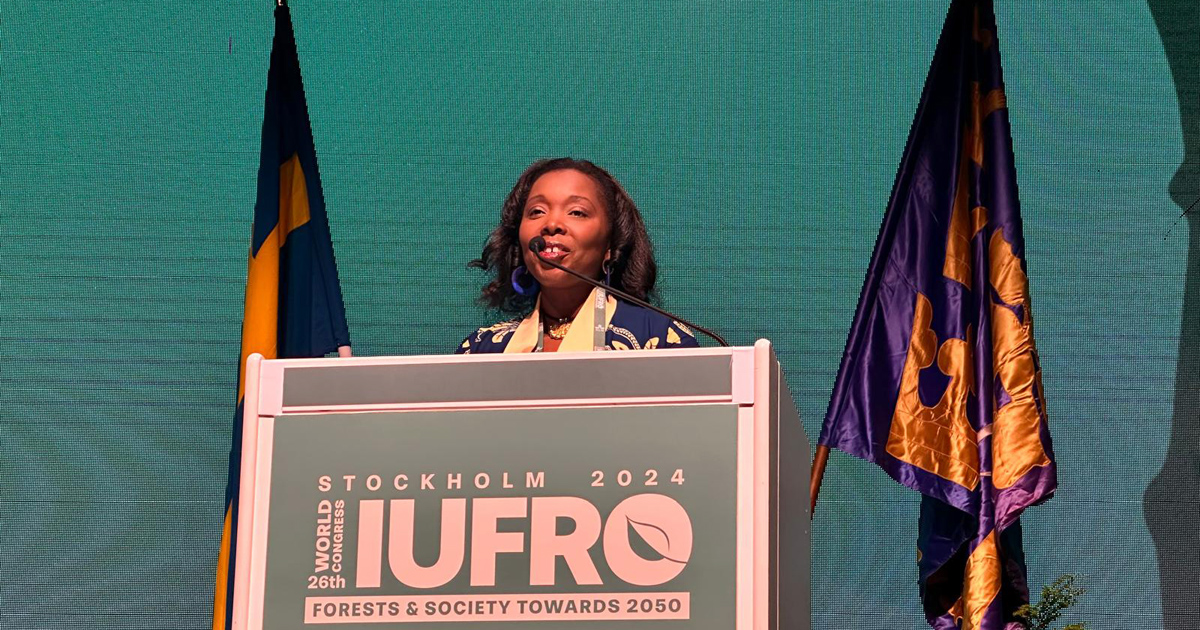
CEO Éliane Ubalijoro promotes future of sustainable forests in Stockholm address
Senior Associate Carol Colfer receives IUFRO Scientific Achievement Award
Stockholm, 24 June 2024 – The Center for International Forestry Research and World Agroforestry (CIFOR-ICRAF) featured prominently at today’s opening session of the 26th World Congress of the International Union of Forest Research Organizations (IUFRO) in Stockholm, where more than 4,000 delegates from over 110 countries gathered to showcase solutions for a sustainable future led by forests.
CIFOR-ICRAF Chief Executive Officer Éliane Ubalijoro joined King Carl XVI Gustaf of Sweden, IUFRO President John Parrotta and other dignitaries at the opening ceremony to begin the weeklong event under this year’s theme: Forests & Society Towards 2050.
“To manage forests sustainably,” King Carl XVI Gustaf said in his welcome address, “we need certain basics in place to create resilient systems. These include stable institutions – like government agencies – stable markets and solid research to help us make smart decisions supporting the green future.”
Over the next 25 years, climate change, biodiversity loss, agriculture and a growing world economy are expected to exert huge pressure on forests and the societies that depend on them. 2050 is a landmark year to achieve the vision of Living in Harmony With Nature of the Convention on Biological Diversity as well as the target of net zero emissions, according to IUFRO.
“The actions we take now will decide the fate of our forests in 2050,” said CIFOR-ICRAF CEO Ubalijoro in her address. “Fortunately, science can give us the tools to succeed, interconnecting all perspectives and navigating the often conflicting, multiple demands on forests.”
Following the opening ceremony, CIFOR-ICRAF Senior Associate Carol Colfer received an IUFRO World Congress Scientific Achievement Award of 2024 for her work on Criteria and Indicators for Sustainable Forest Management (SFM), Adaptive Collaborative Management (ACM), health and forests, landscape mosaics, micro-scale governance, gender and other critical topics.
This year, CIFOR-ICRAF is an organizational partner of the quinquennial event and will co-host the next IUFRO World Congress in Nairobi in 2029.
The two research organizations enjoy a long-standing partnership, cooperating on many initiatives over recent decades.
Starting in 2007, they worked together to stage annual “Forest Days” in parallel with the UN Climate Change Conferences. These ground-breaking side events – which later became known as the International Day of Forests – helped raise the profile of trees and put them firmly on the climate change agenda.
In 2012, ICRAF collaborated on IUFRO’s first-ever regional congress organized on the African continent, co-hosting the event in Nairobi and drawing attention to the vital role that the Global South plays in the fight against climate change.
“Our IUFRO family tree has very deep roots, extending back to the union’s founding in 1892,” said IUFRO President Parrotta. “Over the years, we have grown steadily in terms of the geographic extent of our membership, in the range of forest-related disciplines that we work on, and the diversity of our leadership at all levels.”
CIFOR-ICRAF scientists are scheduled to participate in more than 25 sessions at the congress, including a sub-plenary meeting on 28 June organized by the Forests, Trees and Agroforestry Partnership (FTAP), where scientists will aim to reconcile the trends and perspectives that are at odds with forest health by mid-century. CIFOR-ICRAF supports FTAP as a core partner.
As forests and society strive to secure a net zero future by 2050, forest research provides a scientific knowledge base for sustainable solutions to the intersecting crises of poverty, hunger, biodiversity loss, and climate change.
“As we look to 2050, let us embrace the spirit of innovation, inclusivity, and collaboration,” CEO Ubalijoro said during today’s opening ceremony. “The future of our forests and society depends on our ability to think beyond the present, to anticipate the challenges ahead, and to work together towards sustainable solutions.”
CIFOR-ICRAF has been leveraging its scientific expertise and know-how to produce some of the technological innovations needed over the next 25 years.
Its scientists developed the Regreening App, an Android-based application that allows users to collect data at the farm level on a range of land restoration practices.
Its state-of-the-art laboratories enable scientists to analyze the organic content of soil, or study tree rings to reconstruct past climate patterns, helping predict climate impacts.
And the CIFOR-ICRAF tree genebank safeguards the diversity of trees across Africa by storing and sharing seeds from a vast array of species.
CIFOR-ICRAF also recognizes that forest research must have a global focus. This means dedicating sufficient resources to studying the tropical forests of the Global South, where almost a third of all forest area on the planet is located.
And it means harnessing the potential of youth, women and Indigenous Peoples to protect, restore and responsibly harness forests.
“The one question that you need to ask yourself during this congress is: What can I do to help the future leaders of forestry?” said Isabelle Claire Dela Paz, president of the International Forestry Students’ Association (IFSA). “You – as one of the current leaders in the sector – must become an instrument to building up the youth. Talk to us, listen to us, collaborate with us, and most importantly, invest in us.”













